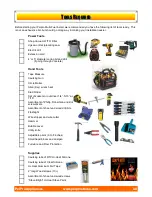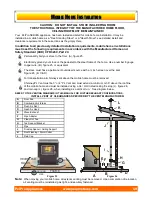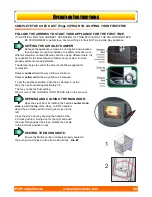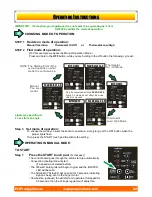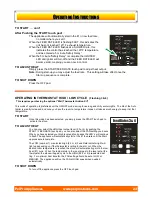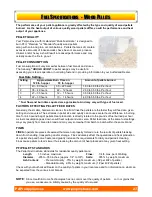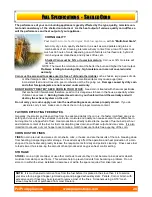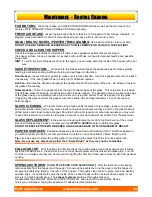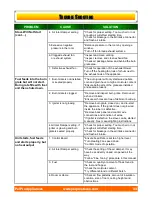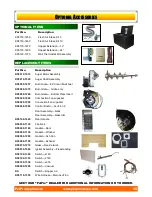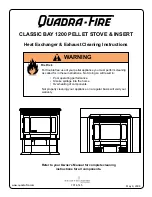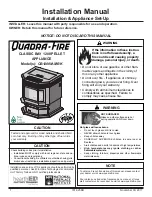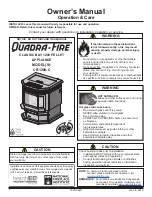
30
P
P
LANNING
LANNING
—
—
P
P
ROTECTION
ROTECTION
& C
& C
LEARANCES
LEARANCES
1 TON, SEASONAL OR BI-SEASONAL
The #1 reason for a service call or unit failing is:
FAILURE TO DO SIMPLE PERIODIC MAINTENANCE.
With proper cleaning and the use of quality pellets, your
PelPro Series appliance
requires very little
maintenance. However,
the following periodic maintenance is strongly recommended
.
NEVER perform any inspections, cleaning, maintenance or service on a HOT STOVE.
ASH PAN:
Found in the front of the pedestal, Remove the two (2) bolts. Dispose ashes into a metal container
with a tight fitting lid. When replacing the ash pan ensure it is pushed all the way in and the two bolts securely
fastened.
ASH TRAP:
[COLD STOVE ONLY]
Remove the metal plate from the back of the firewall. This will expose
the 2 ash traps. Fly ash may be removed by vacuuming inside the trap area. It is also good to use a brush (bottle
cleaner) to reach up and down to scrape the build up off the metal areas.
BURN POT:
This is the ―pot‖ where the pellets are burned in the grate. When removing your grate for
cleaning, check the burn pot area for ash build up. Some ash will fall through the grate holes and build up un-
der the grate. This needs to be cleaned out to prevent lack of air flow through the burn grate. DO NOT push the
ash to the back of the opening, as this not an ash trap and will effect or block off the air flow to the grate.
DOOR GASKET:
Inspect the main door gasket periodically. The main door may be removed to have
frayed, broken or compacted gaskets replaced.
EXHAUST VENTING:
Soot and Fly Ash
:
Formation and Need for Removal— The by products of com-
bustion contain small particles of fly ash. Fly ash will collect in the exhaust venting
system and restrict the flow of flue gases. Incomplete combustion, such as during
startup, shutdown or incorrect operation of the room heater will lead to some sort
of soot formation which will collect in the exhaust system. It is important that the
exhaust system be
inspected and cleaned at least once a year to determine if
cleaning is needed. It is a good practice to inspect after every 1–2 tons of
pellet fuel burning.
Check the clean out tees (4) and elbows (7) in the exhaust system periodically to
determine the cleaning schedule. To remove dust from the vent pipe, tap lightly on
the pipe to dislodge any loose ash. Open the bottom of the ―T‖ (4) to dump the
ash, then vacuum as much of the ash out of the vent pipe as possible.
3 or 4-inch diameter chimney brushes are available for chimney cleaning.
If the exhaust system has a screen (8) on it, frequently clean the screen. A plugged
screen will shut off combustion air and cause a fire to die or burn poorly.
WARNING: Whenever any portion of the pellet venting is disconnected, the joints must be sealed, gas
tight with High Heat RTV silicone sealant.
WARNING:
Unplug your stove's electrical cord prior to opening the sides of the stove or opening the
exhaust system for any inspection, cleaning, maintenance or service work.
2 x
found behind
the rear cover plate.
ASH TRAPS
Burn Pot Area
Air Intake Area
1
2
3
4
5
6
7
8
9
PelPro Appliances www.pelprostoves.com 30

